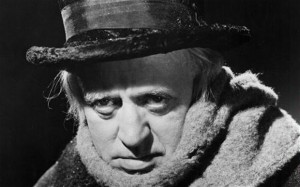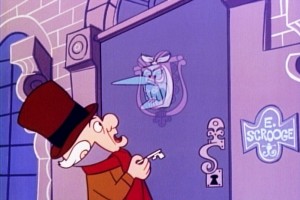Ebenezer Scrooge was visited by three ghosts, so it’s fitting that I tackle the issue of the holidays three times. We’ve discussed terminations close to the holidays, and the custom of dispensing year-end bonuses. But in the end Dicken’s Scrooge was enlightened by the ghosts, and began dispensing his wealth to the Cratchit family (especially Tiny Tim), in amounts disproportionate to the market value of father Bob the clerk’s position.
Most business owners are wealthier than their employees. It’s your business, and you have the right to enjoy the financial benefits of the risk, the work and the sacrifices you make (or made in the past) by taking the profits as your reward. Yet many of us feel a twinge of guilt when we hear of an employee struggling financially. We provide a livelihood for families, and we feel that responsibility every day. When an employee is unable to meet his or her obligations, there is a little internal voice that suggests we should be doing something about it.
 I know owners who diligently avoid having employees visit their homes, because they fear being labeled as “rich.” Others host a holiday party at their house every year, and feel that they are sharing their success with the staff by letting them see the material results of their collective effort. There is no obvious difference in the attitude of the employees between the two . Most of those attending the home-based parties still think that their boss is fair and generous. Some of those who have never seen their boss’s house still assume that he is filthy rich.
I know owners who diligently avoid having employees visit their homes, because they fear being labeled as “rich.” Others host a holiday party at their house every year, and feel that they are sharing their success with the staff by letting them see the material results of their collective effort. There is no obvious difference in the attitude of the employees between the two . Most of those attending the home-based parties still think that their boss is fair and generous. Some of those who have never seen their boss’s house still assume that he is filthy rich.
In a recent meeting of one of my groups in The Alternative Board® a member posed the question; “Why do you try to grow your business?” Not one person answered “To make more money.” They want to offer opportunities to employees, serve customers, and in some cases build a legacy for the future. Once we have satisfied our lifestyle needs, few business owners are driven merely by numbers in a bank account.
Owning a business is a privilege, because none of us would be successful without a decent modicum of luck. It is also a trust. We all carry the burden of knowing that our employees depend on us to make the best decisions, and to anticipate the things that might risk a secure future for them and their families.
We don’t serve that trust by dispensing charity, or by paying a few workers beyond their market value, and thus leaving less for the others. We serve it by watching expenses carefully, by monitoring managers’ decisions that could put jobs at risk, and by offering opportunities for people who want to do better. Our businesses are our most powerful tools to better the lives of others. In the long run, spreading the profits around has far less impact than using them to grow new jobs and new opportunities.
 I thought I’d seen every feature film version of “A Christmas Carol.” I know the Reginald Owen, Alastair Sim, Michael Caine (Muppet), George C. Scott, Patrick Stewart, Bill Murray and Mr. Magoo versions. (It seems upon researching that I missed a recent Jim Carrey rendition.) They differ only slightly, but as I recall in one or two of those Scrooge’s climactic change of heart includes offering Bob Cratchit a partnership.
I thought I’d seen every feature film version of “A Christmas Carol.” I know the Reginald Owen, Alastair Sim, Michael Caine (Muppet), George C. Scott, Patrick Stewart, Bill Murray and Mr. Magoo versions. (It seems upon researching that I missed a recent Jim Carrey rendition.) They differ only slightly, but as I recall in one or two of those Scrooge’s climactic change of heart includes offering Bob Cratchit a partnership.
That is the appropriate role of a business owner. Using your company to give teaching and experience to people so that they can better themselves is the best present anyone could provide. It is one that lasts a lifetime.

2 Responses to Santa Boss: The Role of a Business Owner